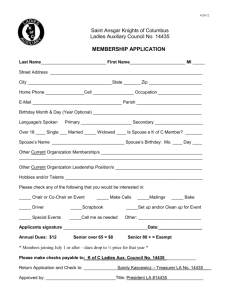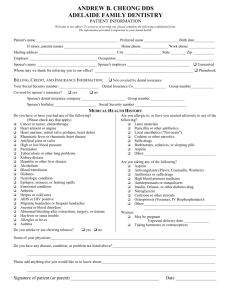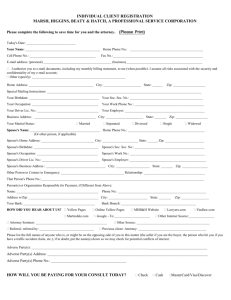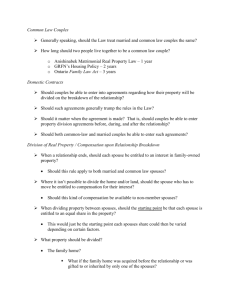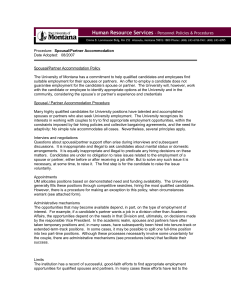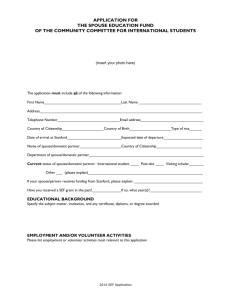2012 MIDYEAR MEETING RESOLUTION 108
advertisement
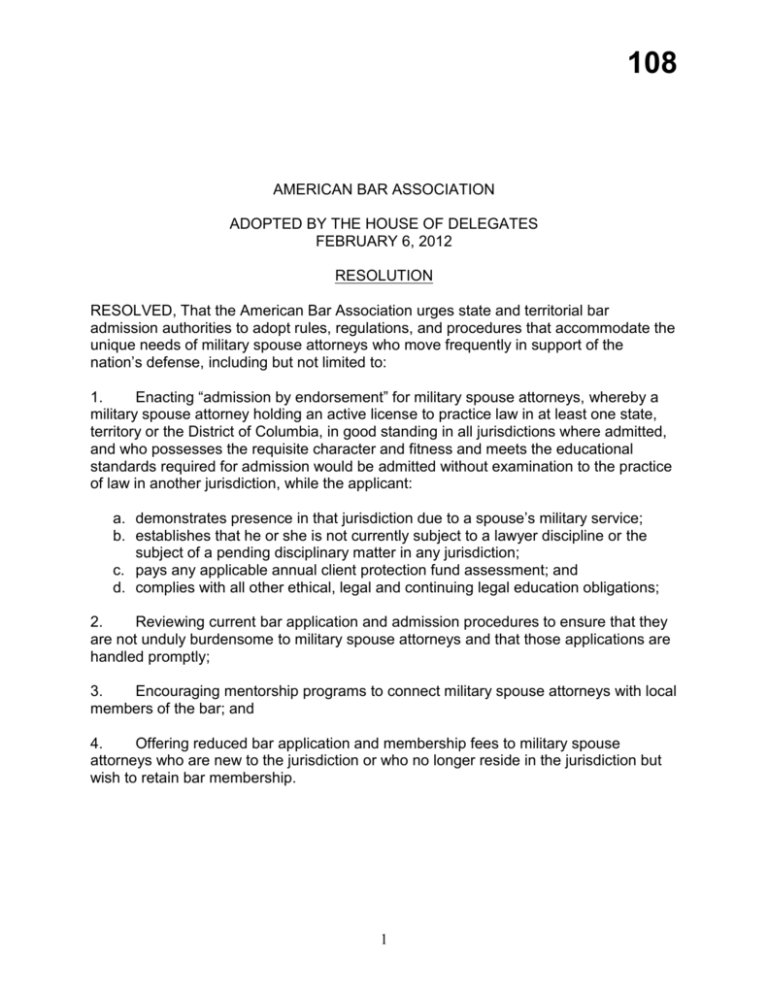
108 AMERICAN BAR ASSOCIATION ADOPTED BY THE HOUSE OF DELEGATES FEBRUARY 6, 2012 RESOLUTION RESOLVED, That the American Bar Association urges state and territorial bar admission authorities to adopt rules, regulations, and procedures that accommodate the unique needs of military spouse attorneys who move frequently in support of the nation’s defense, including but not limited to: 1. Enacting “admission by endorsement” for military spouse attorneys, whereby a military spouse attorney holding an active license to practice law in at least one state, territory or the District of Columbia, in good standing in all jurisdictions where admitted, and who possesses the requisite character and fitness and meets the educational standards required for admission would be admitted without examination to the practice of law in another jurisdiction, while the applicant: a. demonstrates presence in that jurisdiction due to a spouse’s military service; b. establishes that he or she is not currently subject to a lawyer discipline or the subject of a pending disciplinary matter in any jurisdiction; c. pays any applicable annual client protection fund assessment; and d. complies with all other ethical, legal and continuing legal education obligations; 2. Reviewing current bar application and admission procedures to ensure that they are not unduly burdensome to military spouse attorneys and that those applications are handled promptly; 3. Encouraging mentorship programs to connect military spouse attorneys with local members of the bar; and 4. Offering reduced bar application and membership fees to military spouse attorneys who are new to the jurisdiction or who no longer reside in the jurisdiction but wish to retain bar membership. 1 108 REPORT Background The American Bar Association recognizes the unique responsibilities and challenges faced by the military and their families. “Being in the military is a 24/7 commitment that takes its members and their families across the country, and around the world,” according to ABA Immediate Past President Stephen N. Zack.1 By adopting this Resolution, the legal community will support military spouses as they strive to maintain their legal careers in this 24/7 lifestyle. The legal profession has a long history of ensuring that legal procedures do not unduly prejudice servicemembers and their families.2 The Soldiers’ and Sailors’ Civil Relief Act of 19403 was amended in 1942 to add a section specifically extending certain protections to military dependents, including spouses, “to avoid situations in which dependents suffered as a result of the servicemember's period of service.”4 A number of amendments have increased the protections available to both servicemembers and their families. The ABA continues to support legislation enhancing and strengthening legal protections for servicemembers and their families. According to Dennis Archer, ABA President in 2003: The [Servicemembers Civil Relief Act] gives the men and women of our military additional peace of mind, by protecting their rights and interests when they answer the call to duty. More so than words of praise or promise, the Servicemembers Civil Relief Act demonstrates to our soldiers, sailors and their families that our nation values their sacrifice and is behind them, absolutely.5 1 Alexandra Buller, ABA Launches New Website for Military Families, (May 2011), available at www.abanow.org/2011/05/aba-launches-new-website-for-military-families. 2 “During the Civil War, Congress enacted legislation suspending any statute of limitations where the war worked to thwart the administration of justice. In World War I, the Soldiers’ and Sailors’ Civil Relief Act of 1918 directed trial courts to take whatever action equity required when servicemembers’ rights were involved in a controversy.” The Judge Advocate General’s Legal Center & School, U.S. Army, JA 260, Servicemembers Civil Relief Act at 1-1 (March 2006) (citations omitted) (hereinafter “JAG SSCRA Report”), available at www.americanbar.org/content/dam/aba/migrated/legalservices/lamp/ downloads/SCRAguide.authcheckdam.pdf. 3 54 Stat. 1178 (1940). 4 JAG SSCRA Report at 4-1. 5 Dennis Archer, ABA President, “Statement Re: The Signing of the Servicemembers Civil Relief Act” (Dec. 23, 2003), available at www.abanow.org/2003/12/statement-re-the-signing-of-theservicemembers-civil-relief-act; see also “ABA President Urges Congress to Adopt Servicemembers’ Legal Protection Act” (June 24, 2004), available at www.abanow.org/2004/06/aba-president-urges-congress-to-adopt-servicemembers’-legalprotection-act and ABA Resolution 114 (Feb. 2009) (supporting authorizing civil enforcement 1 108 The ABA House of Delegates has adopted many policies supporting and advancing the personal rights and interests of American servicemembers and their families, including the following: urging provision of civil legal assistance to low income military servicemembers and their dependents (8/90, 2/03, and 2/07); supporting federal legislation for advance medical directives prepared for members of the armed forces and their spouses to be recognized as lawful notwithstanding state and territorial law (8/94); protecting military homeowners, including spouses, by allowing them to maintain as a principle residence a home from which they are absent due to military orders (2/00); urging rules permitting children of deployed servicemembers to attend pre-deployment local public schools tuition free even when required to move outside the school district to reside with a temporary caretaker due to a parent's deployment (2/07); urging reexamination of the Feres doctrine whereby servicemembers are denied the benefits of the Federal Tort Claims Act (8/08); and ensuring participation in U.S. elections of military personnel and overseas civilians (2/11). This Resolution differs from other legislation and ABA policies supporting military families by recognizing military spouses as peers, rather than as clients. However, the ideals underlying the ABA’s endorsement of the Servicemembers Civil Relief Act, and of other legislation and administrative action supportive of servicemembers, are the same ideals compelling support for this Resolution. After nearly a decade of armed conflict that has strained military families, the legal community should recognize the sacrifices of military families within its own ranks by easing the licensing restrictions and burdens on military spouses. Unique Challenges Faced by Military Families Unlike the civilian sector, the United States Uniformed Services is not an optional assignment-based system. National security dictates that military families move based upon the needs of the service and servicemembers may face criminal penalties if they fail to report to a duty station as ordered.6 Thus, attorney spouses who seek to maintain successful legal careers face unique challenges due to their geographic insecurity. The current system creates burdens for military spouse attorneys, who must apply for and take the bar exam every two to three years in a new jurisdiction or live and work separate from their servicemember husband or wife. Neither option is appealing, and the latter is nearly impossible, especially in families with children. Many military spouse attorneys work because of financial need, especially attorneys who have student loans to repay.7 actions, private rights of action, and attorney fees for violations of the Servicemembers Civil Relief Act.). 6 UCMJ, 10 U.S.C. § 885 (Desertion); UCMJ, 10 U.S.C. § 886 (Absence Without Leave); see also Paul von Zielbauer, The Army is Cracking Down on Deserters, N. Y. Times (April 9, 2007), available at www.nytimes.com/2007/04/09/us/09awol.html?pagewanted=print. 7 “DoD believes spouse employment is necessary for many military families to meet basic family expenses.” United States General Accounting Office, Military Personnel Active Duty Benefits 4 108 As an example, Hon. Erin Wirth, co-founder of the Military Spouse JD Network8 and Coast Guard spouse, graduated from law school sixteen years ago. Since then, she has moved seven times, taken and passed the full bar exam in three different jurisdictions, been admitted on motion to work for legal aid after being unable to qualify for admission on motion based on years of practice in a fourth jurisdiction, and practiced for the federal government in two other jurisdictions. She has held eleven full or part time jobs, a number of which do not qualify as the full time practice of law frequently necessary to qualify for admission on motion. She has not held the same job for more than three years. To the extent that her experience is atypical, it is because her husband has not been stationed in a war zone, overseas, or in a jurisdiction for less than a year.9 Because of geographic insecurity and licensing restrictions, military spouse attorneys are not encouraged to pursue the legal profession due to lack of financial incentives, educational opportunities, and role models. Attorney military spouses who are currently practicing law must give up traditional careers in order to support the servicemember, or, alternatively, the servicemember is forced to leave the military, causing the military to lose smart, extensively trained, highly skilled, and talented servicemembers. This Resolution supports the legal rights and standing of United States servicemembers and their families by urging that courts and bar admission authorities ease unreasonable burdens on them. Recognizing that frequent transfers are required of military families, courts and bar admission authorities in each state and territory are urged to adopt rules, regulations, and procedures that accommodate the unique needs of military spouse attorneys, including but not limited to: license by endorsement, revised application and admission procedures, mentorship, and fee reductions. Under this Resolution, military spouse attorneys would be full members of the bar and subject to the same ethical, legal, and continuing legal education requirements as other attorneys in the jurisdiction to ensure the protection of clients. Reducing licensing restrictions will improve employment opportunities and the well-being of military families, upon whose service our country’s defenses depend. The Mobility Required of Military Families Reflecting Changing Demographics, but Opportunities Exist to Improve (Sept. 2002) at 8, available at www.gao.gov/new.items/d02935.pdf. 8 Mary Reding, Esq. and Hon. Erin Wirth formed the Military Spouse JD Network so that military spouse attorneys could advocate, educate, and network. See www.MilitarySpouseJDNetwork.org. 9 See Laura Dempsey, The Military vs. Marriages, The Washington Post (Feb 19, 2008), available at www.washingtonpost.com/wpdyn/content/article/2008/02/18/AR2008021801538.html (“I've been a lawyer and an Army wife for 10 years. In that period, I've moved seven times. I've taken four different bar exams and held five different jobs. My income has been taxed in at least five states. My children have had five different nannies. I think it's safe to say that military wives like me face career obstacles that few civilian wives could appreciate.”). 5 108 Military families face unique challenges as they protect our freedom. As explained by the Ohio Women's Bar Association: The backbone of the United States military is the family that supports them while they are at home and away…. Most military spouses are in the labor market, either employed or looking for employment.10 However, the unemployment rate for military spouses is three times as high as their civilian counterparts.11 There have been many studies on why this is the case, but one of the most evident causes is the fact that military families move on average every two to three years.12 Only 10% stay on the same base for longer than five years.13 This has a direct impact on military spouses obtaining and maintaining a career, specifically in the legal profession as a practicing attorney.14 Nationally, research confirms that military spouses15 are more likely to be unemployed than their civilian counterparts.16 Military wives also have a much greater tendency to be underemployed as compared to a weighted group of civilian wives.17 Military wives who are employed earn less, on average, than do civilian wives.18 This is true, even though “military wives have higher levels of education compared with their civilian counterparts.”19 When controlled for differences, “the disparity between military and civilian wife unemployment becomes even clearer and the impact of the husband’s military service is revealed as the major explanatory factor.”20 10 DoD, Report on Military Spouse Education and Employment (Jan. 2008) at 2, available at images.military.com/spouse/Report_to_Congress_on_Military_Spouse_Education_and_Employm ent_Jan_2008.pdf; see also Bluestar Families, 2010 Military Lifestyle Survey, Executive Summary (Sept. 2010) at 8, available at www.bluestarfam.org/resources/Surveys. 11 DoD, Report on Military Spouse Education and Employment at 2. 12 DoD, Report on Military Spouse Education and Employment at 2; United States Government Accountability Office, Military Personnel Active Duty Benefits Reflecting Changing Demographics, but Opportunities Exist to Improve (Sept. 18, 2002) at 8, available at www.gao.gov/new.items/d02935.pdf. 13 DoD, Report on Military Spouse Education and Employment at 2; Nelson Lim, Daniela Golinelli, Michelle Cho, 'Working Around the Military' Revisited, RAND Corporation at 18-19 (2007), available at www.rand.org/pubs/monographs/2007/RAND_MG566.pdf(“only10 percent of military wives had stayed in one location” as compared with half of civilian wives.). 14 Ohio Women’s Bar Association, Report & Recommendation - Provisional Bar Membership, (May 2009),available at www.owba.org/Resources/Documents/Military_Spouses_Report_and_Recommendation.pdf. 15 Although most of the research has focused on wives, research on military husbands finds similar results. RAND 2007 at xvi. 16 Margaret Harrell, Nelson Lim, Laura Werber Castaneda, Daniela Golinelli, Working Around the Military Challenges to Military Spouse Employment and Education, RAND Corporation at 40 (2004), available at www.rand.org/pubs/monographs/2004/RAND_MG196.pdf; RAND 2007 at xiii, xiv, xx. 17 Nelson Lim, David Schulker, Measuring Underemployment Among Military Spouses, RAND Corporation at xvi (2010). 18 RAND 2004 at 48; RAND 2007 at xiii, xiv. 19 RAND 2004 at 15. 20 RAND 2004 at 40; see also 61 (“residential mobility negatively affects the labor market conditions of military wives”). 6 108 A typical military family moves every two to three years, in addition to periods of temporary duty or extended unaccompanied deployments.21 It is not uncommon for a servicemember to be transferred more than fifteen times in a thirty-year career, including tours overseas. Military spouses are more than nine times as likely to have moved across state lines in the last year relative to the total population. Research indicates that “the feature of military life that most negatively affects military wives’ careers is being asked to move often and far.”22 For the servicemember these moves are generally not avoidable, optional, or voluntary. According to the 2007 RAND report, “unlike civilian couples, who can make relocation decisions considering advantages and disadvantages for all family members, military couples must move according to the timing and placement of the service members’ new assignment.”23The failure to comply with transfer orders may be chargeable as a federal offense. Not being where he or she is required to be—when they are required to be there—can result in a court-martial conviction for the military member. Potential penalties include jail, loss of rank, or dishonorable discharge.24 For the spouse of a servicemember, transfer orders are voluntary only in a technical sense. It is unreasonable to expect military spouses who want to maintain their legal careers to live apart from the servicemember, over and above the time they are separated by deployments and unaccompanied tours of duty. Most spouses, especially those with children, choose to accompany the servicemember, disrupting their personal lives and damaging their careers in the process. Current National Initiatives to Reduce Burdens on Military Spouses Recently Congress specifically recognized and ameliorated some of the hardships endured by military spouses based solely on their marital status and their spouses’ profession through the Military Spouses Residency Relief Act.25 The Military Spouses Residency Relief Act amends the Servicemembers Civil Relief Act to provide that a spouse shall neither lose nor acquire domicile or residence in a state when the spouse is present in the state solely to be with the servicemember in compliance with the servicemember’s military orders. This change is part of the national initiative to reduce the burden on military families as they move from state to state. 21 Active duty spouses thirty years old or younger move every thirty-three months due to the service member’s change of duty station, on average. Defense Manpower Data Center, Military Family Life Project (2010), available at conferences.cna.org/pdfs/longitudinalstudy.pdf. 22 RAND 2004 at 18. 23 See RAND 2007 at 4, see also 20 (“military couples have less choice of when or where to move” than civilian couples.). 24 Any person found guilty of desertion or attempt to desert shall be punished, if the offense is committed in time of war, by death or such other punishment as a court-martial may direct, but if the desertion or attempt to desert occurs at any other time, by such punishment, other than death, as a court-martial may direct. UCMJ, 10 U.S.C. § 885 (although death has not been imposed since 1945). 25 50 U.S.C. App. 595 Public Law 111-97 (Nov. 11, 2009); see also www.servicemembers.gov (USDOJ Civil Rights Division). 7 108 The White House, through its Joining Forces initiative, is leading efforts to reduce licensing restrictions and improve employment opportunities for military spouses in every profession. This coordinated and comprehensive federal approach to supporting military families is outlined in the 2011 White House initiative, “Strengthening Our Military Families: Meeting America’s Commitment,” which states: The challenge is to reduce the barriers that currently prevent military spouses from maintaining a career or employment on a normal progression path regardless of relocation. The lack of broad-based reciprocity among the states to recognize professional licenses or certificates held by military spouses creates a significant barrier to employment. Additionally, frequent moves result in military spouses incurring high costs for recertification and increased delays before they are able to work due to state licensing requirements in fields such as teaching and medical services. Finally, employers may need more exposure to the benefits of hiring military spouses.26 The Department of Defense (“DoD”) is also concerned about the impact of spouse employment on military recruitment and retention.27 Inability to pursue employment increases stress and friction within a marriage that can lead to dissatisfaction with the military lifestyle. The failure of a military spouse to find appropriate and fulfilling employment has an impact on the whole family and can be the driving factor in the servicemember’s leaving the service prematurely. As a consequence, years of education and training devoted to that servicemember will be wasted. The ability to maintain or transfer a professional license when moving from state to state has a direct impact on the ability of the spouse to find employment. The DoD Military Community and Family Policy office has addressed the licensing issue through state legislation for those career fields that are governed by state regulatory agencies.28 This includes nearly all medical professionals, real estate brokers, and social workers just to name a few. The practice of law is not governed by a state regulatory agency, therefore the legislation that the DoD has advocated for does not include the practice of law. This Resolution identifies specific ways the legal profession, itself, can develop career opportunities and eliminate professional licensing barriers for military spouse 26 White House, Strengthening Our Military Families: Meeting America’s Commitment (2011), available at www.defense.gov/home/features/2011/0111_initiative/strengthening_our_military_january_2011. pdf. 27 Defense Manpower Data Center, Survey of Active Duty Spouses (2008), available at www.dmdc.osd.mil/appj/dwp/index.jsp. 28 Lisa Daniel, Military Spouses Get Help With Professional Licenses, American Forces Press Service, (June 13, 2011), available at www.defense.gov/news/newsarticle.aspx?id=64285. “States that have enacted laws for endorsement of licenses -- or those waiting for a governor’s signature -- are Arizona, Colorado, Kansas, Montana, North Carolina, New York and Texas. States that allow temporary licenses are Alaska, Florida, Kentucky, Missouri, Ohio, South Carolina and Tennessee. Utah allows nonresident military spouses to use out-of-state licenses, and Virginia allows military spouses who leave the state to re-use the license upon their return.” 8 108 attorneys. The Current Bar Admission Process Creates Barriers for Military Spouse Attorneys The Military Spouse JD Network (“MSJDN”), the leading network of military spouse attorneys, reports that less than a third of its members have full-time employment as attorneys and that approximately half of its members are underemployed in nonattorney positions such as paralegal work, working part-time, or unemployed and actively looking for work. MSJDN members report that licensing restrictions limit their ability to find full time employment as attorneys. These findings are consistent with national statistics regarding the proportionately higher rates of unemployment and underemployment among military spouses. Current bar admission rules hinder the ability of military spouses who are attorneys to practice their profession. Bar admission rules do not provide a mechanism for admission of military spouses temporarily stationed in the jurisdiction or for those who move frequently, often with tours overseas. Military spouse attorneys struggle to become licensed and maintain their licenses for each jurisdiction in which they are transferred. Although many jurisdictions have rules allowing attorneys to be admitted on motion or through reciprocity, those provisions are too limited for military spouse attorneys. Military spouse attorneys have trouble meeting the “previous practice” requirements when: they are recently admitted; their military spouse has been assigned overseas; they have breaks in employment between duty stations; they have held nonattorney or part-time positions; or they have been unable to find legal work at a duty station. Since over ninety percent of military spouses are women, the current system also has a disproportionately negative impact on women.29 Application of current bar admission regulations to military spouse attorneys disproportionately affects the number of women in the legal profession. To the extent these women are unable to become licensed as they move from state to state and overseas, they lose the ability to contribute to and participate in the legal profession. Therefore, allowing military spouse attorneys to maintain their careers supports diversity in the legal profession. The Resolution Appropriate accommodations for military spouse attorneys benefit both the legal community and the military, while maintaining a high level of professionalism. This Resolution would allow military spouse attorneys to maintain their careers while continuing to support the servicemember and our country. By passing this Resolution, the ABA will stimulate discussion of this issue, which will in turn raise awareness on the part of courts, bar admission authorities, legal employers, and the legal community of the impact of military service on their families. These discussions will take place in 29 Military wives are more racially and ethnically diverse than civilian wives. RAND 2007 at xiv. 9 108 conjunction with the publicity from the White House Joining Forces initiative.30 Permitting qualified military spouse attorneys to maintain their legal practice is a significant benefit to their clients. As technology improves, more clients and employers want to retain military spouse attorneys who are transferred. Because of unauthorized practice of law regulations, in many jurisdictions, those attorneys cannot maintain their employment and continue to serve their clients when transferred to and residing in a new jurisdiction.31 Thus, clients lose the benefit of being represented by their preferred attorney, who has invested time and resources on their behalf. The skills developed by military spouse attorneys benefit their clients and the legal community. Military spouses understand the complexities of military life and are well suited to serve clients in the military, either though paid or volunteer work. Moreover, the insights gained from practicing law in multiple jurisdictions, the ability to adapt to a rapidly changing environment, and the capacity to learn quickly how to utilize local resources are just a few skills that benefit their clients. Military spouse attorneys are eager to contribute their unique skills and experiences and to utilize the professional education they worked so hard to attain.32 Moreover, although it is somewhat nontraditional, legal employers in this uncertain economy may benefit from hiring attorneys without a long-term commitment. There are a number of ways that courts and bar admission authorities can ensure that military spouse attorneys have an opportunity to maintain their careers. 1. Bar Admission by Endorsement for Military Spouses Bar admission by endorsement allows qualified military spouses who are in a jurisdiction due to military orders to be admitted without examination as long as they maintain an active license to practice law in one jurisdiction, are members in good standing in all jurisdictions where admitted and possess requisite character and fitness. To ensure public protection, these lawyers also must disclose in their applications for admission by endorsement whether they are currently subject to lawyer discipline or the subject of a pending disciplinary matter in any jurisdiction. They further must comply with all continuing legal education requirements and contribute to the client protection fund. Attorneys admitted by endorsement have the same rights and responsibilities, including compliance with continuing legal education and ethical obligations, as other members of the bar. To protect the public, jurisdictions retain the right to impose discipline or to 30 Current publicity includes Stephen Spielberg, Oprah Winfrey, and Tom Hanks public service announcements encouraging support of military families, 2011, available at www.whitehouse.gov/joiningforces/photo-video. 31 See, e.g., State Bar of Arizona, Unauthorized Practice of Law Committee Advisory Opinion 1002, February 2010, available at www.azbar.org/media/75280/upl10-02.pdf. 32 See RAND 2004 at 87 (“personal fulfillment was the most frequently cited most important reason for working by spouses” working in professional occupations. “Half of lawyers and professors, … viewed personal fulfillment as their primary work incentive.”). 10 108 revoke privileges to practice, as they would with any attorney admitted in the jurisdiction. Whether an attorney is admitted by examination, by motion based upon years of practice, or by endorsement, they would be subject to the same ethical rules and regulations. The ability to impose discipline would continue when the military spouse attorney moves to a new duty station, just as it would with any other attorney who relocates to another state. Jurisdictions typically have exceptions to the previous practice requirement for admission. For example, many jurisdictions allow bar admission with no examination or previous practice requirements for full-time law school faculty members, clinical law professors and law students, in-house counsel, and non-profit legal service organization providers. Military spouse attorneys admitted by endorsement would be required to comply with character and fitness regulations and would need to provide (1) proof of good standing in all jurisdictions in which the military spouse is admitted, (2) Department of Defense identification that the applicant is an accompanying dependent, and (3) acknowledgement of attorney disciplinary rules. The burden of determining who is a military dependent rests with the Department of Defense. License by endorsement remains in effect until the termination of the servicemember’s military orders in the state, unless the follow on assignment is remote or unaccompanied; until the military spouse attorney is no longer defined as a dependent by the Department of Defense; or if the military spouse does not comply with the rules established by the state. It is recommended that character and fitness be determined by a background check from the time the applicant was last admitted in another jurisdiction, to avoid a lengthy admission process. Because military spouses move frequently and have lived in many jurisdictions, often for short periods of time, traditional character and fitness forms may be exceedingly (and unnecessarily) lengthy. 2. Bar Application and Admission Procedures Courts and bar admission authorities can ease the burdens on military spouse attorneys by reviewing the jurisdiction’s bar admission requirements to ensure they present no unreasonable obstacles to the practice of law for qualified military spouse attorneys. The frequent transfers of military families may result in gaps in employment, multiple prior employers, and multiple prior residences. Courts and bar admission authorities should consider whether the reference requirements are appropriate for someone who has moved every two to three years, with tours overseas, and occasional tours of less than a year. For example, Judge Wirth, mentioned above, was required to provide five attorney references in each jurisdiction where admitted for more than six months as well as five character references. This required her to provide, and presumably required the bar to check, twenty-five references. In addition, military spouses may not have practiced in every jurisdiction in which they are admitted, either because of the challenging legal employment market or because the servicemember received new orders 11 108 reassigning them to another jurisdiction before completing the bar application process or before practicing. Courts and bar admission authorities should consider whether there is any flexibility in the application deadline so that military families who receive orders after the application deadline are not delayed for six months waiting for the next bar exam. Servicemembers have no control over when transfer orders are issued and, in fact, those orders can be changed at any point. This system makes it impossible for attorneys to plan ahead and apply for bar examinations in a timely fashion. Flexibility should be permitted, where possible, to ensure that licensing and employment is not significantly delayed, especially given the limited amount of time the attorney is likely to be in the jurisdiction. Gaps in employment and multiple employers or residences can be red flags for bar admission. Character and fitness reviewers should be educated on the frequency (and necessity) of transfers of military families, so that they do not unduly delay admission. Limiting character and fitness determinations to the time since the applicant was last admitted in another jurisdiction may help avoid a lengthy admission process and reduce the burden on the new jurisdiction. The changes to the application and admission procedures will not impact the ability of the jurisdiction to ensure the protection to the public from unscrupulous attorneys. Military spouse attorneys will be subject to the same ethical standards, while providing provisions to address the mobility issues that come with military life. In addition, unlike attorneys who undergo character and fitness reviews only at the beginning of their careers, military spouse attorneys will go through them every time they transfer. 3. Mentorship Programs Participation in mentorship programs is a valuable way military spouse attorneys connect with local members of the bar. Mentorship programs ensure that attorneys new to the jurisdiction are familiar with the nuances of local practice. In addition, for military spouse attorneys who may not know any attorneys in the jurisdiction, mentorships can help develop professional networks, which can be helpful in orienting the military spouse attorney to the jurisdiction’s ethics rules as well as for career advancement. According to the 2004 RAND study, “Frequent long-distance moves make it difficult for military wives to develop the kinds of networks that can help them in the labor market.”33 Mentorship programs are crucial for the military spouse's professional development. 4. Reduced fees Application and membership fees may be reduced for military spouse attorneys who are new to the jurisdiction or who no longer reside in the jurisdiction, but wish to RAND 2004 at 19 (also noting that “employers may offer them lower salaries, choose not to hire them for key positions, or not invest in their training.”). 33 12 108 retain bar membership there. As members of multiple bars, the costs of bar membership dues, on top of student loans, can be overwhelming, particularly for military spouse attorneys unable to find full time employment as lawyers. Bar membership, however, helps military spouse attorneys when they are new to the jurisdiction to learn about local practice and helps them to maintain their connection with the jurisdiction after being transferred. Conclusion Through the adoption of this Resolution, the ABA articulates its support of military families within the profession by welcoming those attorneys relocating as a result of military orders, while at the same time maintaining a high standard of professionalism and proficiency. While the number of military spouse attorneys is relatively small,34 this rule will not only improve the lives of that group but also open the doors for a growing number of attorney spouses in the future. Easing bar membership burdens will encourage a talented pool of independent, intelligent, and resourceful women and men to begin or continue their legal career. Both the legal community and our Armed Forces will benefit from allowing these individuals to practice in their chosen profession while supporting their spouse’s commitment to our country. Respectfully submitted, Mary B. Cranston, Chair ABA Commission on Women in the Profession February 2012 34 Less than one percent of Americans serve in uniform. White House, Strengthening Our Military Families: Meeting America’s Commitment (2011). It is estimated that ten percent of civilian military spouses have advanced degrees, of which a law degree is one of many. Defense Manpower Data Center 2008. 13 108 GENERAL INFORMATION FORM Submitting Entity: ABA Commission on Women in the Profession Submitted By: Mary B. Cranston, Chair, Commission on Women in the Profession 1. Summary of Resolution. The resolution urges state and territorial bar admission authorities to adopt rules, regulations, and procedures that accommodate the unique needs of military spouse attorneys, who move frequently in support of the nation’s defense. 2. Approval by Submitting Entity. The Commission on Women in the Profession has approved submission of this resolution at its August 6, 2011 business meeting 3. Has this or a similar resolution been submitted to the ABA House of Delegates or Board of Governors previously? No 4. What existing Association policies are relevant to this Resolution and how would they be affected by its adoption? The ABA House of Delegates has adopted many policies supporting and advancing the personal rights and interests of American servicemembers and their families, including the following: urging provision of civil legal assistance to low income military servicemembers and their dependents (8/90, 2/03, and 2/07); supporting federal legislation for advance medical directives prepared for members of the armed forces and their spouses to be recognized as lawful notwithstanding state and territorial law (8/94); protecting military homeowners, including spouses, by allowing them to maintain as a principle residence a home from which they are absent due to military orders (2/00); urging rules permitting children of deployed servicemembers to attend pre-deployment local public schools tuition free even when required to move outside the school district to reside with a temporary caretaker due to a parent's deployment (2/07); urging reexamination of the Feres doctrine whereby servicemembers are denied the benefits of the Federal Tort Claims Act (8/08); and ensuring participation in U.S. elections of military personnel and overseas civilians (2/11). 14 108 5. What urgency exists which requires action at this meeting of the House? There is a national movement originating from the White House Joining Forces Initiative, the Department of Defense, and the Military Spouse JD Network to reduce licensing barriers for military spouses. By taking action at this meeting, the House will provide a timely framework for the States to address licensing issues for military spouse attorneys. Moreover, acting now demonstrates the ABA’s leadership and continued support of military families. 6. Status of Legislation. (If applicable.) See above. 7. Brief explanation regarding plans for implementation of the policy, if adopted by the House of Delegates. The policy will be disseminated to the bar admission authorities and state bars of the 50 states with a letter from the appropriate ABA official urging that appropriate accommodations be adopted to support military families and enhance the career development of military spouse attorneys. 8. Cost to the Association. (Both direct and indirect costs.) None. 9. Disclosure of Interest. (If applicable.) Not applicable. 10. Referrals. (List entities to which the resolution has been referred, the date of referral and the response of each entity if known.) The resolution with report was referred to the Section of State and Local Government Law on September, 26 2011 which has agreed to cosponsor; and to the Commission on Racial and Ethnic Diversity on October 28, 2011 which has agreed to cosponsor. On November 4, 2011 the resolution with report was referred to the Section of Individual Rights and Responsibilities, which as agreed to cosponsor; the Section of Legal Education and Admission to the Bar; the Government and Public Sector Lawyers Division, which has agreed to cosponsor; the Young Lawyers Division; the Judicial Division; the Section of Litigation, which has agreed to cosponsor; the Standing Committee on Armed Forces Law, which has agreed to cosponsor; the Standing 15 108 Committee on Client Protection; the Standing Committee on Ethics and Professional Responsibility; the Standing Committee on Lawyers’ Professional Liability; the Standing Committee on Legal Assistance for Military Personnel, which has agreed to cosponsor; the Standing Committee on Professional Discipline; the Hispanic National Bar Association; the National Association of Women Lawyers, which has agreed to cosponsor; the National Conference of Women’s Bar Association, which has agreed to cosponsor; the National Bar Association, which has agreed to cosponsor; and the Conference of Chief Justices and Bar Activities and Services. 11. Contact Person. (Prior to the meeting. Please include name, address, telephone number and email address.) Estelle H. Rogers (Washington DC) 202-337-3332, estellerogers@comcast.net Mary Reding (CA), 937-609-4549, redingmary@yahoo.com Hon. Erin Wirth (DC), 202-523-5753, briefcounsel@msn.com Veronica M. Muñoz (staff) Cell phone: 312-730-7026, veronica.munoz@americanbar.org 12. Contact Person. (Who will present the report to the House. Please include email address and cell phone number.) Estelle H. Rogers 4580 Indian Rock Ter, NW Washington, DC 20007 Cell Phone: 202-337-3332 estellerogers@comcast.net 16 108 EXECUTIVE SUMMARY 1. Summary of the Resolution The resolution urges state and territorial bar admission authorities to adopt rules, regulations, and procedures that accommodate the unique needs of military spouse attorneys, who move frequently in support of the nation’s defense. 2. Summary of the Issue that the Resolution Addresses Current bar admission rules hinder the ability of military spouses who are attorneys to practice their profession. Bar admission rules do not provide a mechanism for admission of military spouses temporarily stationed in the jurisdiction or for those who move frequently, often with tours overseas. Military spouse attorneys have unique burdens in their efforts to become licensed and maintain their licenses for each jurisdiction to which they are transferred. 3. Please Explain How the Proposed Policy Position will Address the Issue Appropriate accommodations for military spouse attorneys benefit both the legal community and the military, while maintaining a high level of professionalism. This resolution would encourage licensing authorities to adopt policies that would allow military spouse attorneys to maintain their careers while continuing to support their servicemember spouses, as well as our country. By passing this resolution, the ABA will also stimulate discussion of this issue, which will in turn raise awareness on the part of bar admission authorities, legal employers, and the legal community of the impact of military service on their families. 4. Summary of Minority Views The Commission is not aware of any formal opposition at this time. 17


